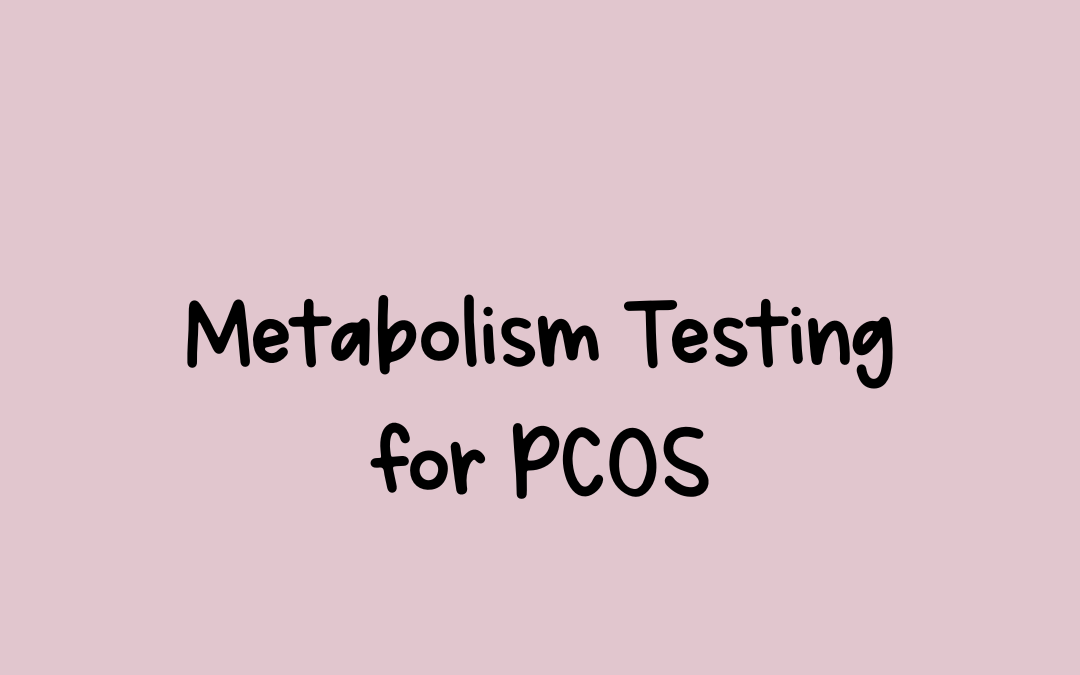
by AmyPlano | Jun 8, 2023 | PCOS and metabolism, PCOS and Weight Gain, Weight Loss
Do you have PCOS and are unable to lose weight in spite of an intense exercise regime and a disciplined diet? Have you hit a plateau in your weight loss? Would you like to take the “guesswork” out of determining your calories to achieve your goals? Well if you answered “heck yes” to any of the questions about then you may be interested in learning more about metabolism testing for PCOS. Knowing your exact metabolic rate can help alleviate all these problems and more.
What is Metabolism
First things first, before we talk about metabolism testing and PCOS (and why it is so friggin’ important for women with PCOS!) we need to define metabolism. Did you know even when you’re at rest, your body needs energy for all of its “silent” functions, such as breathing, circulating blood, adjusting hormone levels, and growing and repairing cells? The number of calories your body uses to carry out these basic functions is known as your resting metabolic rate (RMR).
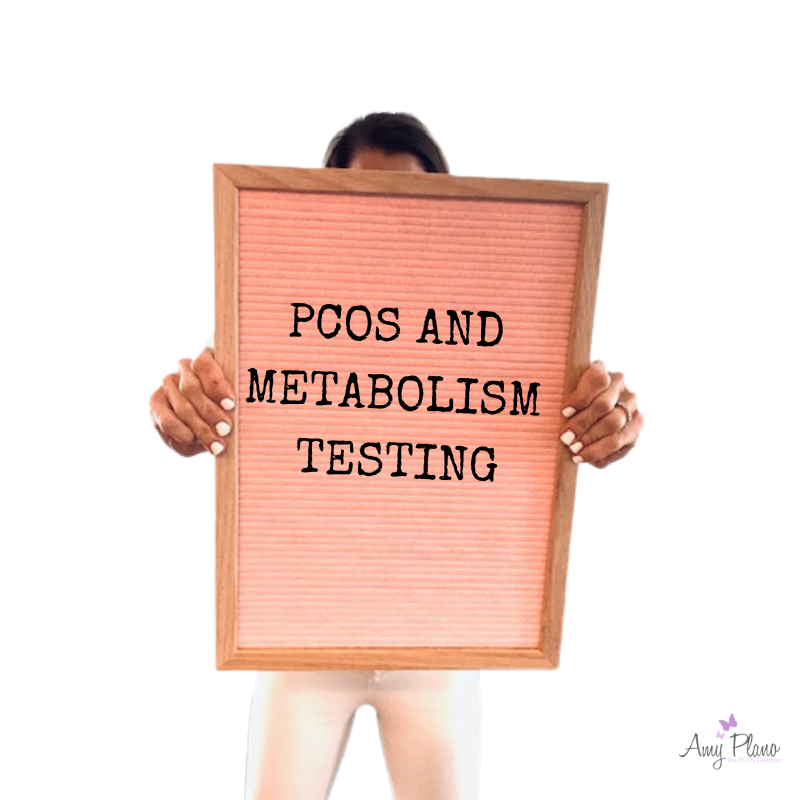
There are many factors that determine our metabolism. They include:
- Your body size and composition. People who are larger or have more muscle burn more calories. Even at rest, these folks tend to have higher RMRs.
- Your sex. Men usually have less body fat and more muscle than women of the same age and weight, which means men burn more calories at rest (Boo!) But don’t worry, I will be sharing some tips for how we chicks can optimize our metabolisms.
- Your age. As you get older (sigh), the amount of muscle you carry tends to decrease. Fat accounts for more of your weight, slowing down calorie burning.
Two other important factors that determine how many calories your body burns each day:
Food processing (we call this thermogenesis!)
Did you know that digesting, absorbing, transporting, and storing the food you consume also burns calories? Score! About 10 percent of the calories your burn each day come from the digestion and absorption of food and nutrients.
Physical activity
Physical activity and exercise— account for the rest of the calories your body burns up each day. Physical activity is by far the most variable of the factors that determine how many calories you burn each day.
So now you know what makes up your metabolism we can finally get down to good stuff!
Below are my top three reasons why metabolism testing for PCOS is so stinking important.
No more guesswork
How many times have you entered your height and weight into an online metabolism calculator only to get some crazy number which you have no idea how to interpret?
I cannot tell you how many times patients come into my office following a calorie level that is completely wrong for the goals they are trying to accomplish. This frustrates the heck out of me. It’s not that they are unsuccessful for lack of trying. It’s simply because they have been provided with the wrong information.
By having your metabolism tested you will now know the exact number of calories your body needs to accomplish your dietary and fitness-related goals. There is no more guessing or even second-guessing where your calories need to be! Through the use of cutting-edge technology, we can help you determine the exact amount of calories you need to reach your goals. Headache solved. Period. End of story.
Provides an accurate baseline
Girl, you have BIG goals which I love and admire. However, how can you accomplish your goals if you don’t know where to start? Conducting metabolism testing for PCOS will allow you to establish a solid baseline. Therefore, as things like your body composition, weight, or performance markers change over time you can adjust your calories relative to your new goals.
Independent of what your specific goals are we all need a caloric starting point. If we don’t have a starting point or baseline and we start making changes to our diet how can we tell what specific calorie level is working? Simply put – we can’t.
Therefore, by having your metabolism tested before making any significant dietary and workout changes you are armed with an accurate, reliable calorie level to base your goals on.
It helps when you are stumped
Knowing your metabolic rate when you have PCOS can be critical when you are stumped. As mentioned previously many women base their goals around a calorie level that is not in tune with their goals.
Trying to gain lean muscle mass but struggling like crazy? It could be that your calories are too low. We all know that in order to build anything we need ‘extra’ resources, right? That extra might be money, resources, or time. The same goes for putting on muscle. In this case, the ‘extra’ needs to be in the form of calories. Therefore, for a woman aiming to put on muscle, they need to FIRST make sure they are taking in enough calories to do.
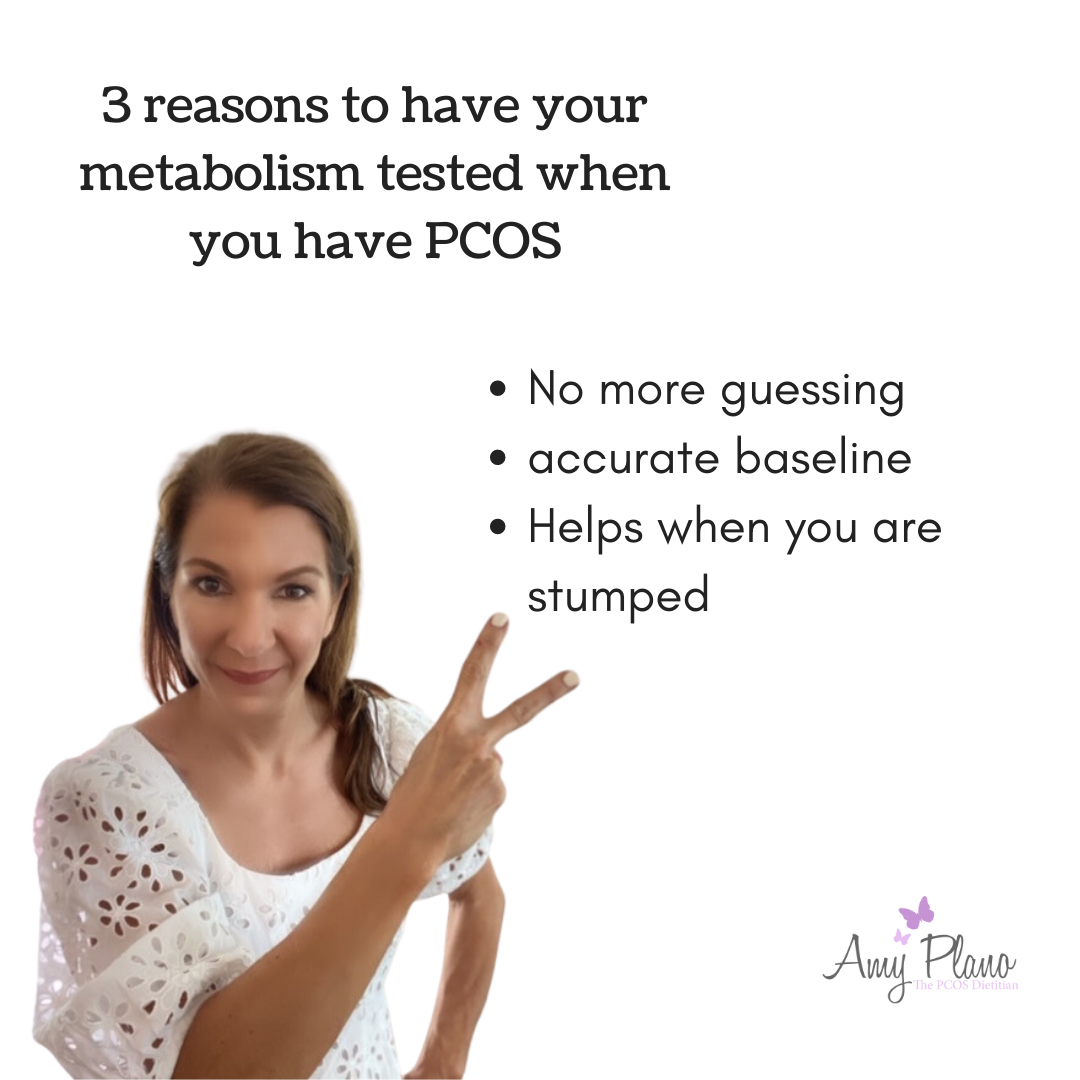
On the flip side, do you feel like you are at a weight loss plateau? Are you meticulously counting calories, carbs, protein, and everything under the sun and still not losing weight? Is MyFitnessPal definitely not your pal? For most people, the simple answer is their calories are not in tune with their weight loss goals. It could be that their calories are too low. Or it could mean that their calories are too high. How the heck will they know the store if they test their metabolism?
Next steps for metabolism testing for PCOS
So those are my top three reasons in support of metabolism testing for PCOS. I hope you found this information helpful. If you want to have your metabolism tested the cost is $150.00 and you would need to come to our Orange, CT office. It is a quick breathing test that takes less than 10 minutes. Plan for about 30 minutes for the entire visit.
Here is more info on how to prepare for the testing.
Shoot me an email at amy.plano@yahoo.com and I would be happy to provide additional deets. I go you, boo!
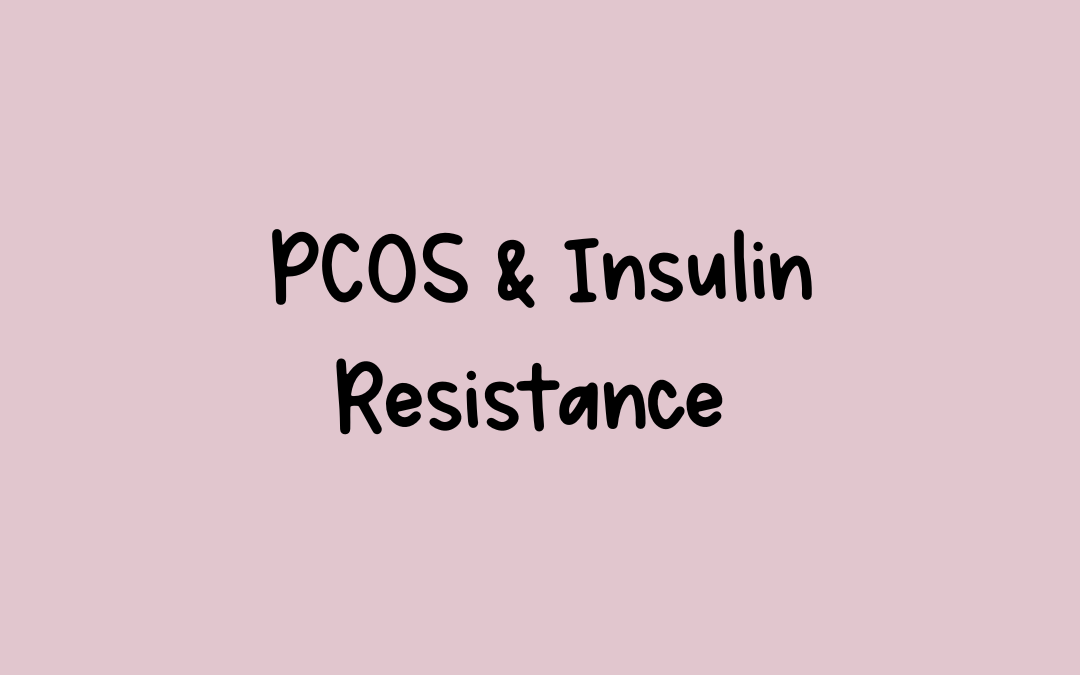
by AmyPlano | Mar 20, 2023 | General information about PCOS, PCOS and metabolism, Weight Loss
A common symptom and driver of Polycystic Ovarian Syndrome (PCOS) is insulin resistance or the inability of your body to effectively use the hormone insulin.
Did you know that up to 80% of women with PCOS deal with insulin resistance (IR)?
While it is not part of the diagnostic criteria for PCOS, the two are frequently associated with one another. If IR is not treated properly, it can lead to further hormonal and metabolic problems. Which for obvious reasons, you want to avoid!
In today’s article, I will be breaking down the connection between PCOS and IR. This includes what insulin resistance is, how it relates to PCOS, and my best tips for improving IR as a PCOS dietitian. Keep reading to learn more!
Are you pre-diagnosis and wondering if you have PCOS? Head over to this page on my website to learn more information about what PCOS is and how it is diagnosed.
What is Insulin?
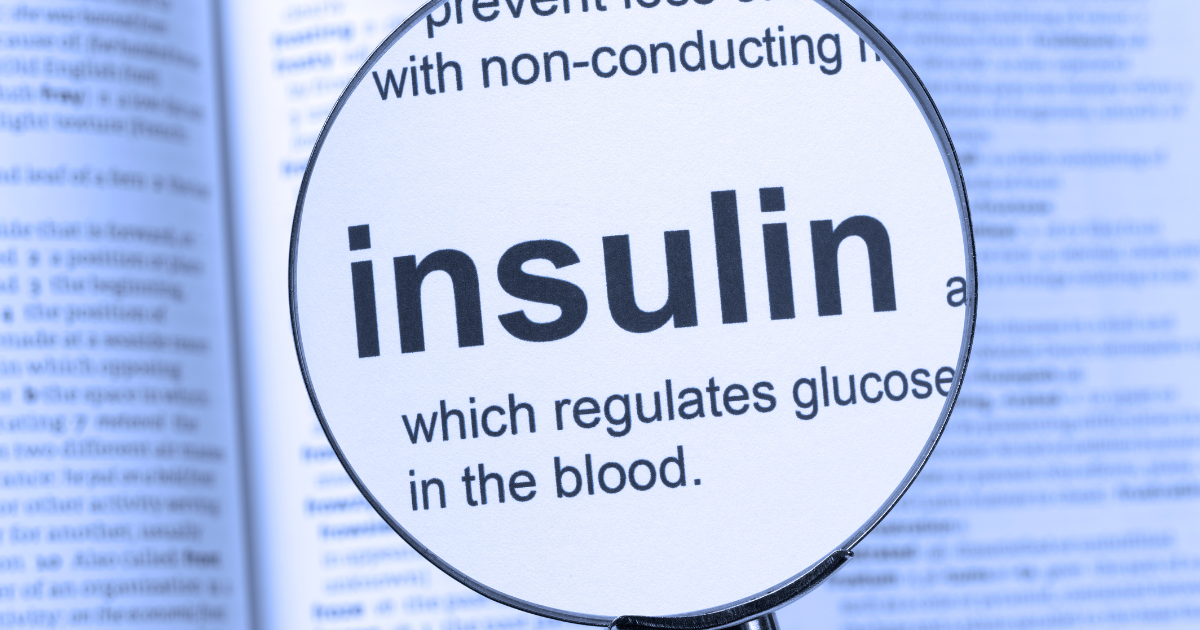
Insulin resistance involves a naturally occurring hormone inside your body called insulin. Insulin is produced in your pancreas and regulates the amount of glucose, or sugar, in your blood.
How it works (in simple terms):
- When you eat food, it gets broken down into sugar and enters your bloodstream
- Your pancreas is signaled to release insulin
- Insulin works hard to help the sugar get used as energy in your cells or signals the liver to store the sugar to use later
- This lowers the amount of glucose in your blood
However, the process only works this way when your body is functioning how it should. People living with certain conditions, such as diabetes, develop the inability to produce and utilize insulin correctly.
What is Insulin Resistance?
Now that you’ve learned about insulin, let’s dive into what insulin resistance is. Insulin resistance is when your cells stop responding to insulin properly.
Imagine your pancreas is pumping out insulin in response to all of the sugar in your blood. After a while, your cells become sensitive or resistant to this insulin and aren’t able to use it in the right way anymore.
Typically your poor pancreas will react by making even more insulin until it can’t keep up any longer. As a result, your blood sugar levels stay high and can start to harm your body.
Symptoms of Insulin Resistance
So, how do you know if you are insulin resistant?
Typical signs and symptoms of insulin resistance to look out for in women with PCOS:
- Increased or frequent urination
- Excessive hunger or thirst
- Feeling tired all the time
- Feeling hungry after you eat
- Acanthosis nigricans (dark pigmentation and thickening of the skin)
- Elevated inflammatory markers and lipid levels
- High fasting blood sugar and insulin levels
- And more!
Gaining weight and difficulty losing weight are also associated with insulin resistance in women. However, it is important to note that signs and symptoms may be different for everyone.
IR is typically diagnosed using lab work that tests for fasting glucose and insulin levels, as well as the HOMA-IR index (a scale used to assess how your body uses insulin).
How are PCOS and Insulin Resistance Related?

Many people associate PCOS with a hormonal disorder involving the ovaries and ovulation, but it is also a metabolic disorder that has an impact on your whole body.
We are continuing to find out more and more about the connection between PCOS and insulin resistance. Many researchers believe that insulin levels are linked to PCOS because lots of women with PCOS have too much insulin inside their bodies.
Insulin resistance is not only a symptom of PCOS but can actually drive the condition and make it worse. Having high insulin levels in the blood is associated with an increase in androgen (male sex) hormones such as testosterone. We know that women with PCOS already have elevated levels of androgen hormones, so this is not ideal.
In the reverse direction, androgen levels can also increase insulin levels. Many women with PCOS find themselves in a vicious cycle because as one rises, the other follows along. Symptoms start to worsen and quality of life can absolutely decrease!
How are IR and Weight Gain Related?
I mentioned that IR can lead to weight gain- but why is this? When insulin levels are elevated, it causes you to store fat very easily. Insulin can also stimulate appetite and make you more hungry. As your insulin levels increase, you may find that you are craving more sugary and carb-rich foods.
Because of these factors, studies show that women with PCOS and IR are more likely to gain weight and have trouble keeping it off. They also have an increased risk for type 2 diabetes, obesity, and other metabolic complications.
If you have PCOS and struggle to lose weight, working on your insulin resistance is a great step towards reaching your weight loss goals.
Tips for Improving Insulin Resistance

Nutrition and lifestyle changes are the best way to improve insulin resistance. Lots of research is emerging on how with physical activity and the right eating patterns, insulin resistance can be repaired.
My best tips for addressing and improving IR:
- Focus on an overall nutrient-dense, balanced diet and a regular exercise routine that is sustainable for you and your lifestyle.
- You do not need to cut out all carbs! Instead, prioritize whole-grain and high-fiber carbohydrate options when possible.
- Examples include quinoa, whole wheat, brown rice, legumes, fruits, and vegetables
- Additionally, pair your carbohydrates with lean protein and healthy fats to create a balanced meal.
- Maintain a healthy weight and get regular bloodwork done to check glucose and insulin levels.
- Eat regular meals at regular intervals throughout the day and try to avoid skipping meals for periods time.
- Address any nutrient deficiencies that may contribute to IR such as vitamin D, vitamin B12, and omega-3s. Include whole food sources of these nutrients in your daily diet.
- Manage your stress levels and make sure you are getting good quality sleep at night.
Some women with PCOS may benefit from insulin-reducing drugs such as Metformin or Actos. It is important to consult with your healthcare team about what treatment options are right for you!
PCOS and Insulin Resistance: The Takeaway
If you are a woman with PCOS, it is likely that you are insulin resistant to some extent and could benefit from reducing insulin levels in your body.
Many signs and symptoms become tolerable after improving IR. Yes, there’s hope! You can use the tips I outlined above as a great starting point for addressing this underlying issue.
Looking for additional guidance and support with nutrition and PCOS? I know this all can be overwhelming at first, but don’t worry, I got you! You do not need to go another day being frustrated over your PCOS symptoms.
I am a specialized PCOS weight loss dietitian and am here to help. Head over to my services page to learn more about my personalized programs that are tailored to your individual needs. It is time to lose weight, get healthy AF, and feel fabulous along the way.
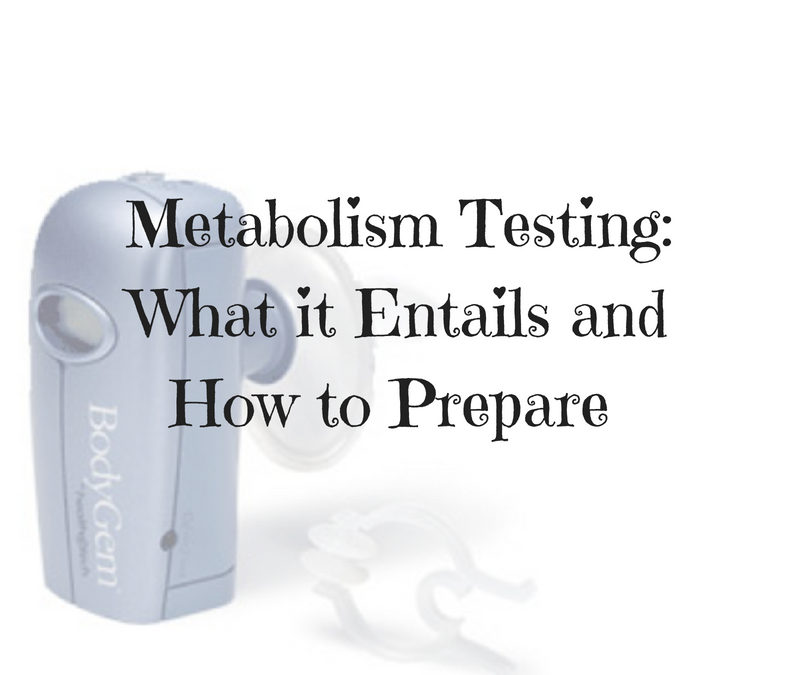
by AmyPlano | Jul 9, 2018 | PCOS and metabolism, Uncategorized
What is metabolic testing ?
The million dollar question on everyone’s mind, “what is metabolic testing ?” Many people have heard the term but have no clue what to expect when they come in to have their metabolism tested. The goal of this blog is to clarify this information and tell you exactly how to prepare for the testing to ensure the best results.
Trust me – there is absolutely nothing remotely scary about having your metabolism tested. Think about it like a walk in the park compared to things like a oral glucose challenge or the fun 18 viles of blood you had pulled for your PCOS panel. In fact – I can almost guarantee you will be skipping out of my office with the new information in hand like a kid on Christmas day.
First things first, metabolism testing does not hurt. I promise! We don’t draw blood. Also there is NO physical exertion involved. In the past, I have had patients show up in their workout gear thinking they were going to participate in something that might resemble a stress test. This is certainly not the case. So no worries you can leave your running shoes at home!
The device we use to measure your metabolism is called the Bodygem. This device measures your metabolism by capturing the air you breath.
Sounds pretty easy? Well it is.

Three things to do to prepare for the metabolism test:
Come fasted with no caffeine in your system for 4 hours prior to your test. You can drink plenty of water though!
Please don’t exercise within 4 hours of the test.
Arrive not having smoked a cigarette within 4 hours of the test.
Caffeine, exercise, and nicotine all can slightly increase your metabolic rate. Therefore, we do our best to minimize these variables so we can deliver you the most accurate results.
Curious about what other factors might influence your metabolism? Check out last week’s informative blog “RMR Testing 101” on this exact topic.
The actual test
Once you arrive we will get you all set up! You will sit peacefully in a chair with a small mouth tube in your mouth and a cute little nose clip on. The goal of the nose clip is to create a vacuum seal so no air escapes.
I promise, I will not post any Facebook pictures with your sexy nose clip on:)
By measuring both the amount of oxygen you exhale and the amount of carbon dioxide you expire we are able to calculate your metabolism. It’s that simple. This method is called indirect calorimetry and is one of the most accurate ways to measure metabolism. The test itself takes about 10 minutes.
Like I mentioned, the test does not hurt. However, some people find it uncomfortable as you need to breathe through your mouth for the duration of the test. However, I am pretty sure you have been through worse.
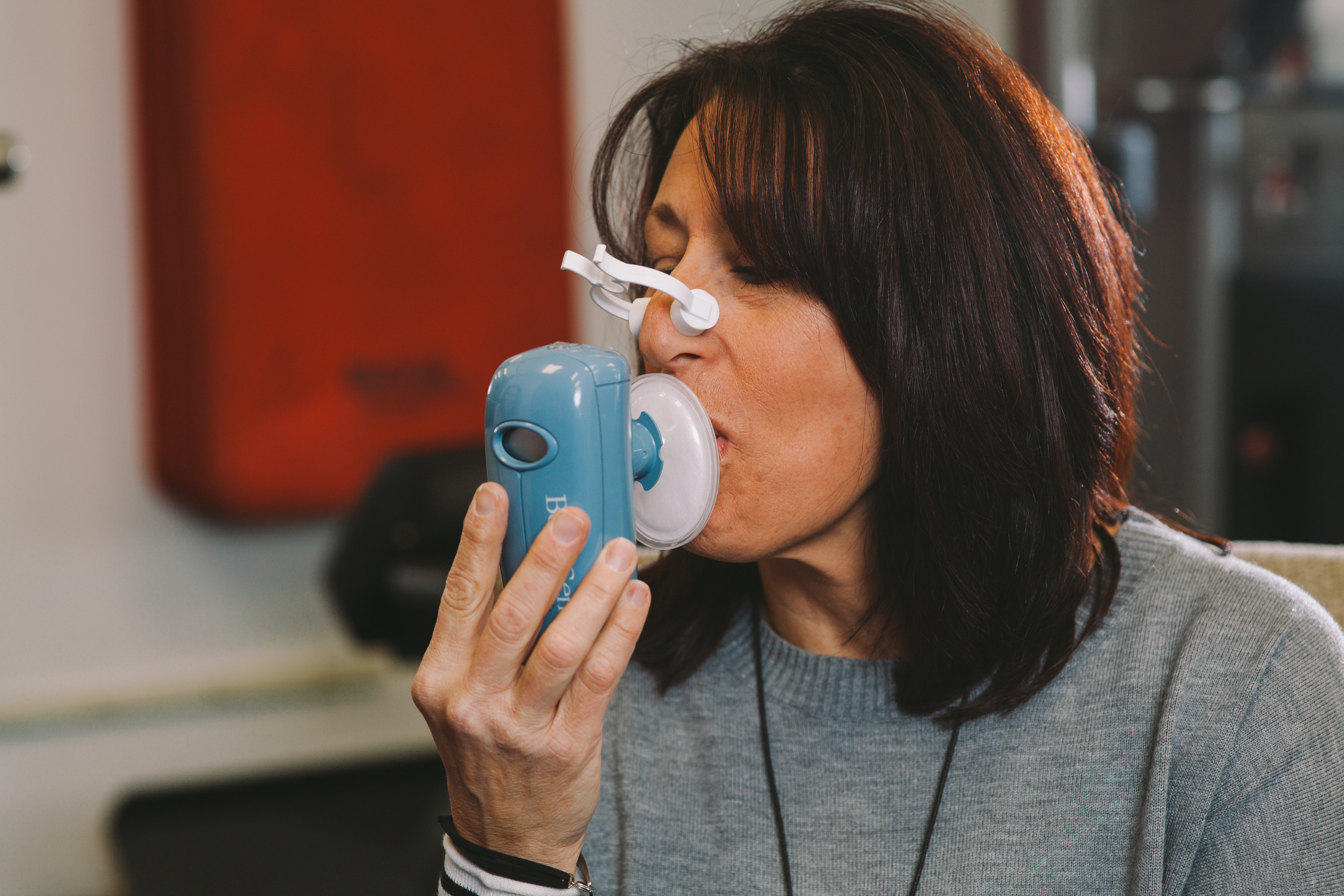
Once the test is complete we need to talk goals. Generally speaking most patients with PCOS only have one goal – to lose weight. Therefore, the next step will be to weigh you and test your body fat. That way we have a starting point for you to gauge your progress.
Next, we will gather your demographics. Factors such as your age, sex, occupation, type and frequency of exercise, and even your sleep patterns are all important variables in determining an appropriate calorie level for your goals. All this information is then entered into a software program which then generates several important numbers.

The Bodygem tells us the following:
Exactly how many calories you need to take in on the days you workout
Exactly how many calories you need to take in on your non-training (rest) days.
How you compare to other individuals with the same demographics
Your BMI
Once we have this important information I can then specifically tell you where your calories need to be to accomplish your weight loss goals. I can also make suggestions on your macros if that is something you are interested in. If you need help setting up these numbers in a tracking program like MyfitnessPal I am happy to help guide you as well.
If you need additional services like a customized meal planner with specific meal suggestions or guidance on how to incorporate carbohydrate cycling or intermittent fasting these can all be provided at an additional fee.
The entire metabolic test plus the consult should take no longer than 45 minutes. You will leave with a personalized print out with your results and a solid knowledge of what is metabolic testing really entails. No guesswork involved!
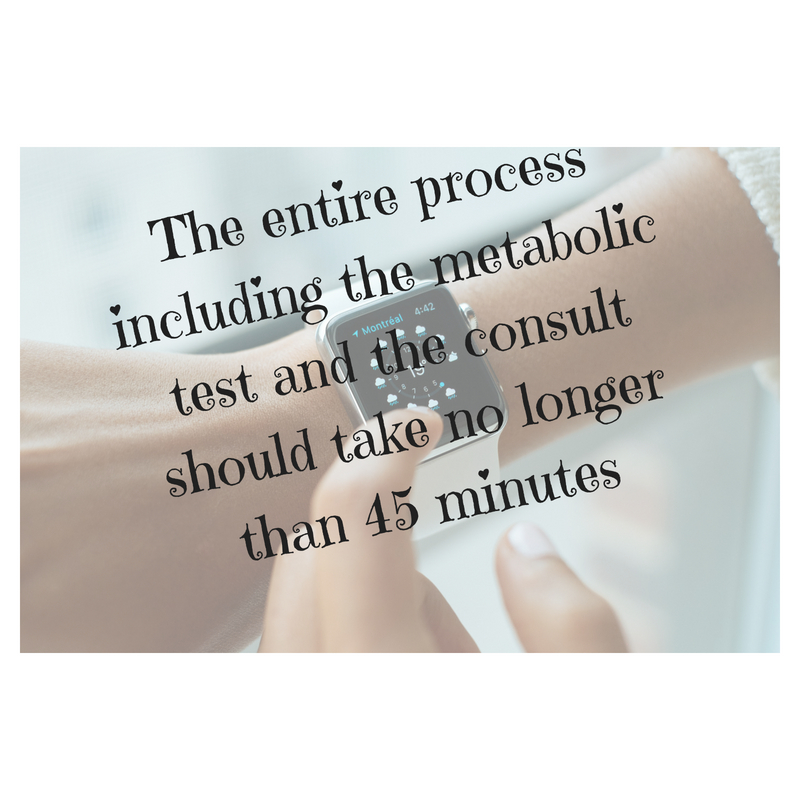
On next week’s blog we will dive deeper into the results. We will interpret the results of three actual Bodygem results and discuss how to apply the information. So now when someone asks you the question, ” what is metabolic testing ” you will be able to give them a A+ answer 🙂
P.S. The icing on the cake is if you purchase the metabolism test during the month of July you will be entitled to a 40 % discount for my birthday. Just use coupon code thisis40 when you schedule your metabolism test on www.amyplano.com to receive the discount. However, act fast as this discount will only be around until July 31, 2018.
Have questions on metabolic testing? Please don’t be shy! Ask in the comments section below.
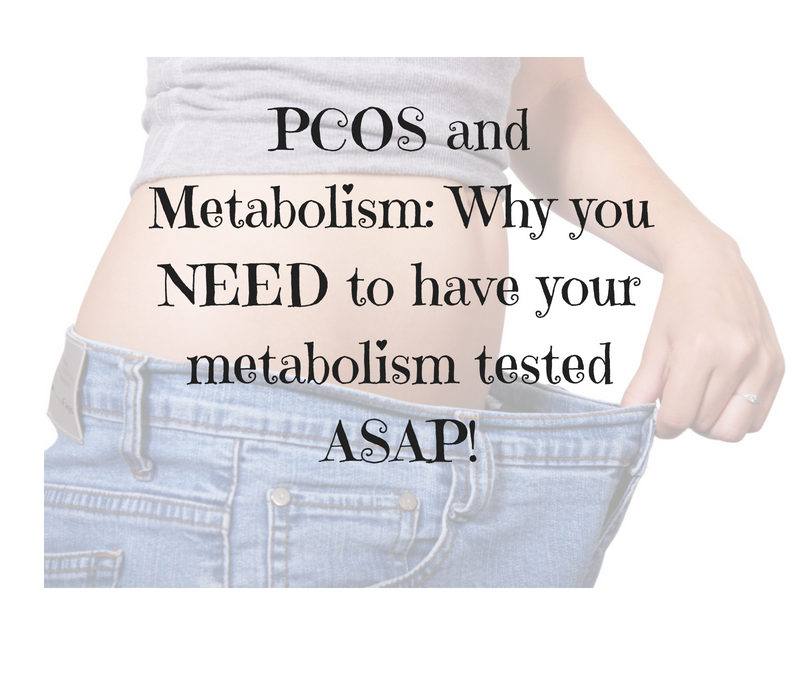
by AmyPlano | Jul 2, 2018 | General information about PCOS, PCOS and metabolism
Are you unable to lose weight in spite of vigorous exercise and a disciplined training schedule? Are you looking to maximize your performance yet feel like despite all your efforts you are failing miserably? Have you hit a plateau in your weight loss? Would you like to take the “guesswork” out of determining your calories to achieve your goals? Well if you answered “heck yes” to any of the above questions then you are likely the perfect candidate for RMR testing.
What is Metabolism
First things first, before we talk about RMR testing and why it is so friggin’ important we need to define metabolism. Did you know that even when you’re at rest, your body needs energy for its “silent” functions? These include breathing, circulating blood, adjusting hormone levels, and growing and repairing cells. The number of calories your body uses to carry out these basic functions is known as your basal metabolic rate (BMR) or more often referred to outside of a clinical setting as resting metabolic rate (RMR).
There are many factors which determine our metabolism. Some include:
Your body size and composition.
People who are larger or have more muscle burn more calories. Even at rest these folks tend to have higher RMR’s.
Your sex.
Men usually have less body fat and more muscle than do women of the same age and weight. This means men burn more calories at rest (Boo!). But don’t worry, I will be sharing some tips for how us chicks can optimize our metabolisms.
Your age.
As we get older (sigh), the amount of muscle we carry tends to decrease. Fat accounts for more of our weight, slowing down calorie burning.
[Truth bomb: If you consistently work out with weights you can help off-set some of this loss 🙂 ]
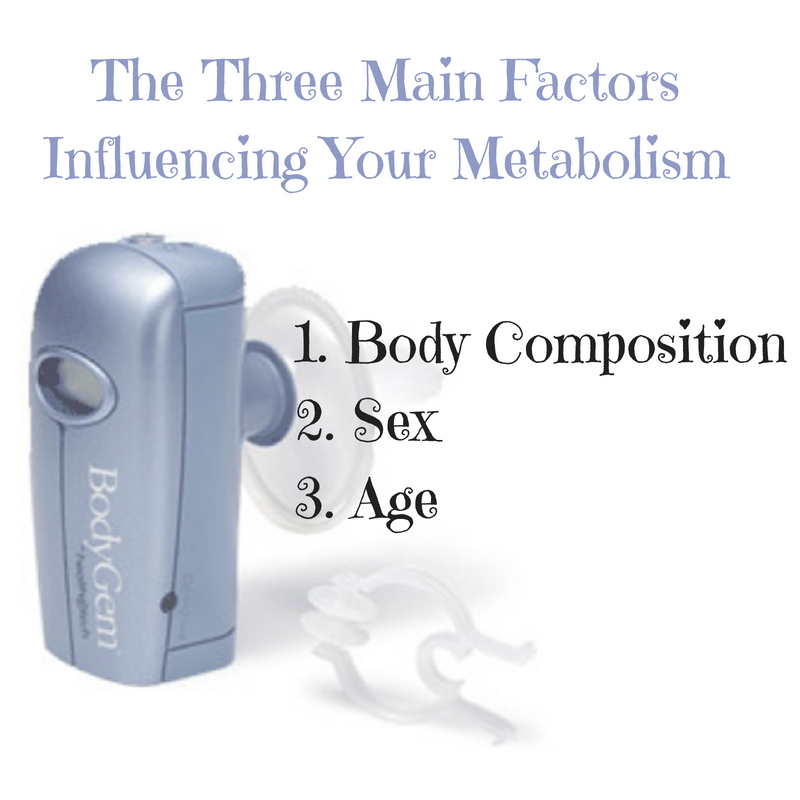
Two other important factors that determine how many calories your body burns each day:
Food processing (we call this thermogenesis!)
Did you know that digesting, absorbing, transporting and storing the food you consume also expends calories? Score! About 10 percent of the calories you burn each day come from the digestion and absorption of food and nutrients.
Physical activity
Physical activity and exercise accounts for the rest of the calories your body burns up each day. It comes as no surprise that physical activity is by far the most variable of all the factors.
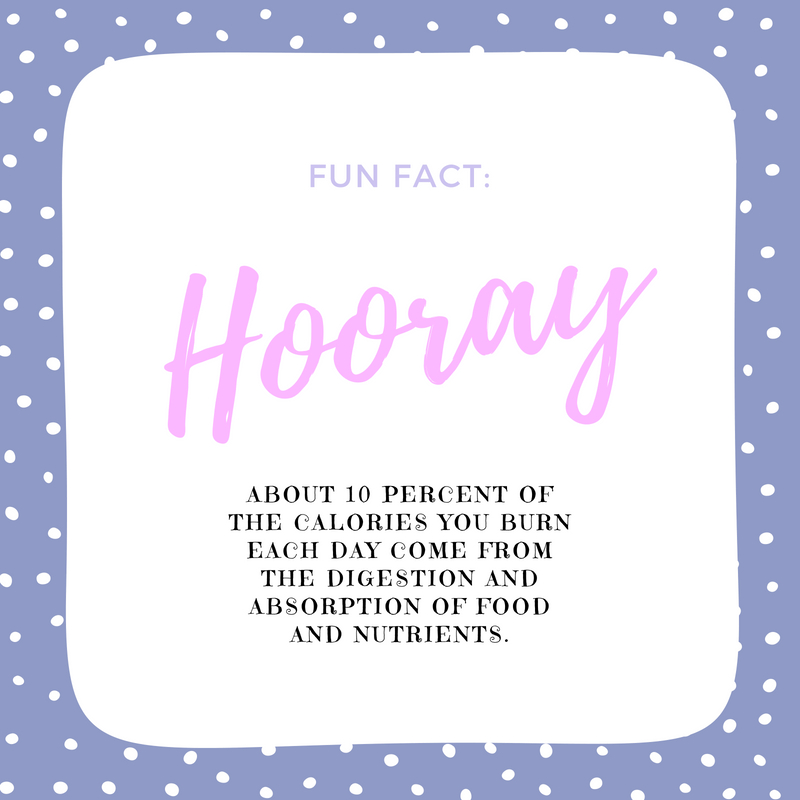
The changes in overall body mass (increase or decrease) ultimately comes down to long-term energy balance which is represented by energy in (via food) and energy out (via metabolic rate). Total energy expenditure is determined by many factors including: body composition, sex, age, thermogenesis and physical activity. Having ‘good’ genetics certainly doesn’t hurt either! So now that you are a master of ‘all terms metabolism’ let’s get down to business.
Here are my top three reasons for why getting your RMR tested is SO important to achieving your body composition and training related goals
1. Takes the guesswork out.
By having your metabolism tested by a professional you never need to ask yourself the annoying questions, “How much or little should I be eating ?!?”
How many times have you entered your height and weight into an online metabolism calculator only to get some crazy number which you have no idea how to interpret?
I cannot tell you how many times patients come into my office following a calorie level that is completely wrong for the goals they are trying to accomplish. This frustrates the heck out of me. It’s not that they are unsuccessful for lack of trying. It’s simply because they have been provided with the wrong information.
By testing your RMR you will now know the exact number of calories your body needs to accomplish your dietary and fitness related goals. There is no more guessing or even second guessing where your calories need to be! Through the use cutting edge technology we can help you determine the exact amount of calories you need to reach your goals. Headache solved!
2. Gives you an accurate baseline.
If you don’t know your baseline calorie needs how do you know if what you are doing is ‘working’?
You have got big goals which I love and admire. However, how can you accomplish your long-term goals if you don’t know where your baseline needs currently are? Testing your metabolism before you make significant changes to your exercise and/or training routine can provide you with a solid foundation in which to make adaptations. Therefore, as things like your body composition, weight and/or performance markers change over time you can adjust your calories relative to your new goals.
Independent of what our specific goals are we all need a caloric starting point. If we don’t have a baseline and we start making changes to our diet how can we tell what specific calorie level is working? Simply put – we can’t.
Therefore, by testing your RMR before making any significant dietary and/ or training changes you are armed with an accurate, reliable calorie level to base your goals on.
3. It helps you when you are stumped.
Knowing your RMR gives you clarity in those moments when no matter how hard you try – you just cannot seem to tackle your dietary and/or fitness goals.
Knowing your your RMR can be critical when you are stumped. As mentioned previously many people base their goals around a calorie level that is not in tune with their goals. Along with the headache this creates can come a massive amount of frustration. Unfortunately, if you have been there you know exactly what I am talking about 🙁
Trying to gain lean muscle mass but struggling like crazy? It could be that your calories are too low. We all know that in order to build anything we need ‘extra’ resources, right? That extra might be money, resources or time. Same goes for putting on muscle. In this case, the extra needs to be in the form of calories. Therefore, for someone aiming to put on muscle they need to FIRST make sure they are taking in enough calories to do.

On the flip side, do you feel like you are at a weight loss plateau? Are you meticulously counting calories, carbs, protein and everything under the sun and still not losing weight? Is MyFitnessPal definitely not your pal? For most people the simple answer is their calories are not in tune with their weight loss goals. It could be that their calories are too low. Or it could mean that their calories are too high. How the heck will they know unless they actually test their metabolism?
Knowing your unique RMR for the different ‘seasons’ can help optimize your nutrition during both your off-season and peak training periods. During training, you need to make sure you are taking in enough calories to support not only your training but your ideal body composition for your sport. It’s no surprise when an athlete is not taking in enough calories how quickly they feel the side effects. Unintentional weight can lead to fatigue, burnout and injury. All of these can be factors can be minimized if not avoided entirely.
Case in point – I rest my case. Plain and simple – anyone with a performance or body composition related goal should have their metabolism tested. And truth be told I don’t know a whole lot of people who don’t share these goals (especially the later!) By testing your RMR you will no longer be ‘spinning your wheels.’ The precise tools you need to determine the exact calorie level to fit your specific goals is attainable. And just like Jim Rohn’s stated, “When you know what you want and you want it bad enough, you’ll find a way to get it.”


P.S. Did you know we are running a 40 % discount on RMR testing for the month of July? Use the coupon code thisis40 when scheduling your metabolism testing under the ‘appointments’ tab on our website www.amyplano.com
P.P.S. What are you waiting for? This fantastic deal will not be around forever. Cut through all the confusion and get the numbers you need.
P.P.P.S. Does any of this mumbo-jumbo about RMR testing resonate with YOU? If so, in what way? Share your thoughts in the comments below. We ♥ to hear your thoughts. Don’t be shy – we don’t bite.

by AmyPlano | Jul 2, 2018 | General information about PCOS, PCOS and metabolism, Uncategorized, Weight Loss
So it is true … this girl right here turns 40 years old on Friday, June 29th. And what better way to celebrate my 40th then with YOU my loyal readers. So how would you like to receive a present from me? How does a 40 % discount on a metabolism test to celebrate this fabulous occasion sound? I don’t know about you but it sounds pretty dang awesome to me.

Heading into the next decade can be a drag. So rather than have a pity party for myself I decided to give you a pretty sweet present to mark this milestone birthday – 40 % off metabolism testing for the whole month of July. Whoot! Whoot!

For the whole month of July redeem coupon code thisis40 when scheduling your metabolism test to receive 40 % off each individual test. The normal rate for a metabolism test is $150.00. Therefore, by redeeming the code thisis40 you save yourself 60 bucks! If that is not pretty sweet – then I don’t know what is.
Important note: In order to receive the most accurate reading on the metabolic test you should be fasted (no food), with no exercise or caffeine within 4 hours of your test time. You can drink plenty of water – just nothing with caffeine or calories.
Below are the steps to redeem your discounted metabolism test:
- Click HERE and you will be re-directed to the scheduling section of this website.
- Click the link for “Metabolism Testing” under appointments.
- When the prompts ask you “with” who you would like to schedule you can choose either myself or my fabulous RD Audrey. The discount applies to us BOTH.
- Select the time slot you would like to come in for your metabolism test.
- Next put in your name, phone number and email address.
- Within the information section where it says “Redeem Coupon” put in the discount code thisis40
- Follow the prompts for payment
- Once you have provided payment you will receive an email confirmation with the date and time of your visit.
- Arrive fasted, with no caffeine or exercise within 4 hours of your test.
Our office is located at 500 Boston Post Road, Orange, CT 06477. We are in the same plaza as Hawley Lane Shoes. When you pull into the plaza look for signs for The Plano Program.
Over the next month I will be releasing more information about why having your metabolism tested is SO friggin’ important – so stay tuned for blog updates.
Please fee free to share this birthday gift with anyone who you think might benefit – which I think is pretty much anyone with nutrition related goals. After all who does not want to know their metabolism? Said no one ever ?
Have you ever had your metabolism tested? Did you find it helpful in reaching your nutrition related goals. Please tell us your experience in the comments below.



by AmyPlano | Aug 5, 2016 | PCOS and metabolism, PCOS Medications, Weight Loss
If you have PCOS  , there is a good chance you have heard of the medication metformin. However, what you may not know is why it was prescribed for you in the first place. So much of the advice I give to patients surrounding diet revolves around many of the same reasons and principles why women with PCOS are put on metformin. Therefore, I thought it would be beneficial to discuss the basics of metformin and how it can help with insulin resistance, decreasing your testosterone, improving your chances of ovulation, enhancing fertility and you guessed it – weight loss!
, there is a good chance you have heard of the medication metformin. However, what you may not know is why it was prescribed for you in the first place. So much of the advice I give to patients surrounding diet revolves around many of the same reasons and principles why women with PCOS are put on metformin. Therefore, I thought it would be beneficial to discuss the basics of metformin and how it can help with insulin resistance, decreasing your testosterone, improving your chances of ovulation, enhancing fertility and you guessed it – weight loss!
What the heck is metformin?
Metformin is an insulin-sensitizing agent. What this means is metformin makes your body more sensitive to the effects of the hormone insulin. But more about that later!
Metformin comes in tablet form and the dose is gradually increased until the maximum dose required is achieved. Most women with PCOS start at a dose of 500 mg and increase their dose up to 1500 – 2000 mg usually in a 4-6 week span.
Metformin does the following:
- inhibits liver production of glucose
- increases the uptake of glucose by the cells
- decreases oxidation of fatty acids
- decreases the absorption of glucose in the intestines
Note: Metformin is the most commonly prescribed drug for diabetes.
I have PCOS, NOT diabetes? So, why did my GYNO prescribe metformin for ME?!?
Around 70- 80 % of women with PCOS experience what is called Insulin Resistance (IR). If you have IR, your body produces enough insulin, but does not effectively use it. Therefore, your body is not sensitive to the effects of insulin. Your doctor prescribed metformin to help your body respond better to insulin.

Why is insulin SO dang important?
Insulin plays a critical role in metabolism—the way the body uses food for energy. When you eat, the digestive system breaks down carbohydrates—sugars and starches found in many foods—into glucose. Glucose is a form of sugar that enters the bloodstream. With the help of insulin, glucose gets processed into the cells where it is used for energy.
What is Insulin’s Role in Blood Glucose Control?
When blood glucose levels rise after we eat, the pancreas releases insulin into the blood. Insulin and glucose then travel in the blood to the cells throughout the body.


In a healthy person, these actions help regulate blood glucose to keep insulin levels within a normal range.
But I already told you, my doc told me I am NOT healthy! I have PCOS AND Insulin Resistance SO what does that mean?
When someone has insulin resistance their muscle, fat, and liver cells do not respond properly to insulin. Their bodies cannot easily absorb glucose from the bloodstream. As a result, the body needs higher levels of insulin to help glucose enter cells. Basically the cells, despite the presence of insulin in the bloodstream, don’t function properly and don’t allow the glucose in the blood into the cells.
What Role does Insulin Resistance play in PCOS and Weight Loss ?
Insulin is considered a storage hormone. When insulin levels are high (as they are in most women when they are diagnosed with PCOS), the body goes into storage mode. This means the body stores glucose as body fat instead of using it for fuel.
And guess what? What do you think has one of the biggest affects on raising insulin levels? Carbohydrates – especially the refined types! Eating substantial amounts of processed carbohydrates creates large spikes in insulin levels. For women with PCOS – this is like pouring salt on an open wound. No bueno amiga!
As you know, many women who have PCOS are already overweight and carry a substantial amount of body fat in their belly area. Elevated weight and belly fat can further increase IR. Therefore, it no surprise that women who have PCOS have a hard time losing weight – even if their diet and exercise are “spot on.” Insulin resistance and excess weight creates a vicious cycle of weight gain in women with PCOS. And for some – without metformin – this weight is increasingly difficult to take off.
As if that was not bad enough! IR also increases testosterone levels, disrupts menstrual cycles and decreases a women chance of fertility.
How Does Metformin Benefit Women with PCOS?
Metformin is a super hero in my book for women who have PCOS and IR!
Metformin has been used off label in PCOS to prevent diabetes and increase ovulation through weight loss (1). In a recent randomized controlled trial comparing metformin, oral contraceptive pills (OCPs), and the combination of the two in patients with PCOS without T2D, metformin alone or with OCPs decreased weight and BMI. The median decrease in weight with metformin at 12 months was 3 kg (25th and 75th quartiles; -10.3, 0.6). OCP use was associated with increased weight changes of 1.2 kg (25th and 75th quartiles; -0.8, 3.0), and the combination decreased weight by 1.9 kg (25th and 75th quartiles; -4.9, 0.1). One patient in the metformin group dropped out due to nausea; no other side effects or adverse events were reported (2). Therefore, by using metformin by itself or in conjunction with OCPs, women with PCOS experienced a significant decrease in weight over the course of one year.
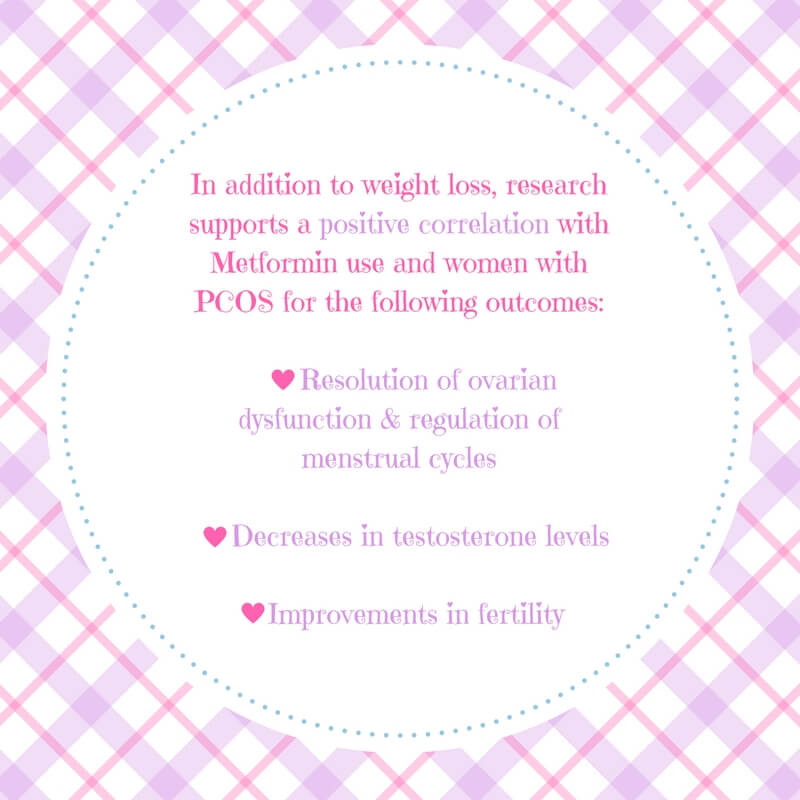
Metformin is also likely to delay diabetes onset and has a role in PCOS in those at high risk of diabetes. Boom!
While I do not think it is a miracle drug by any means, I personally have seen many of the positive outcomes I described above in my patients. However, with that being said, these same patients are also strongly adhering to my dietary and exercise advice AND are compliant with taking their metformin. You cannot have one – without the other!
Therefore for many women who have PCOS, taking metformin should be a no brainer due its profound impact on metabolic and reproductive function.



References:
- Nieuwenhuis-Ruifrok AE, Kuchenbecker WK, Hoek A, Middleton P, Norman RJ. Insulin sensitizing drugs for weight loss in women of reproductive age who are overweight or obese: systematic review and meta-analysis. Hum Reprod Update. 2009;15:57-68
- Glintborg D, Altinok ML, Mumm H, Hermann AP, Ravn P, Andersen M. Body composition is improved during 12 months’ treatment with metformin alone or combined with oral contraceptives compared with treatment with oral contraceptives in polycystic ovary syndrome. J Clin Endocrinol Metab. 2014;99:2584-2591.

























